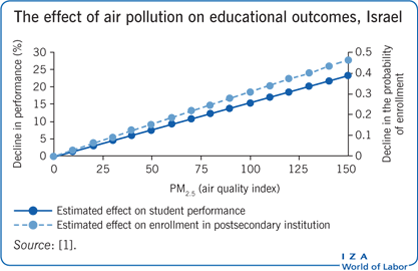Elevator pitch
The link between air pollution and human health is well-documented in the epidemiology and economic literature. Recently, an increasing body of research has shown that air pollution—even in relatively low doses—also affects educational outcomes across several distinct age groups and varying lengths of exposure. This implies that a narrow focus on traditional health outcomes, such as morbidity and mortality, may understate the true benefit of reducing pollution, as air pollution also affects scholastic achievement and human capital formation.
Key findings
Pros
Better air quality conditions are linked with improved test scores and school attendance.
School absences induced by air pollution may cause parents to miss work days, and incur sizable costs to schools located in states where funding is dependent on attendance.
Better air quality can improve matching between students and their subsequent occupations by reducing the distortionary effect of air pollution on the reliability of exams.
Stronger air quality regulation in economically deprived areas can improve social mobility, as the parts of cities that are most exposed to pollution tend to be the poorest.
Cons
Evidence on the expected monetized educational benefits of improving air quality is very limited.
The precise underlying channels linking pollution with scholastic achievement are still not fully clear, which limits the ability to construct efficient policy responses.
Stronger air quality regulation in economically deprived areas can improve social mobility, as the parts of cities that are most exposed to pollution tend to be the poorest.
